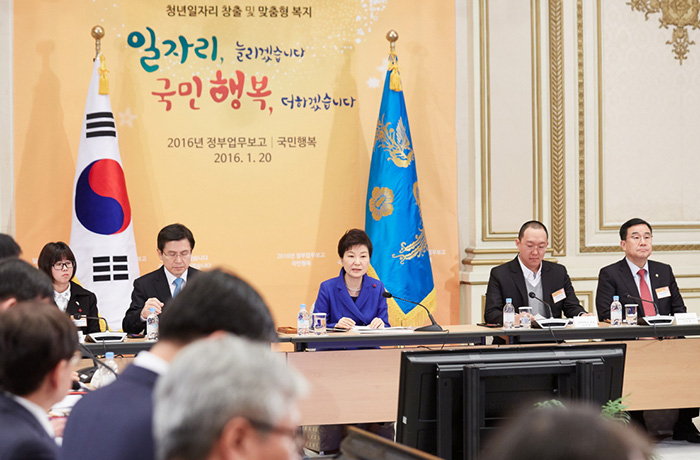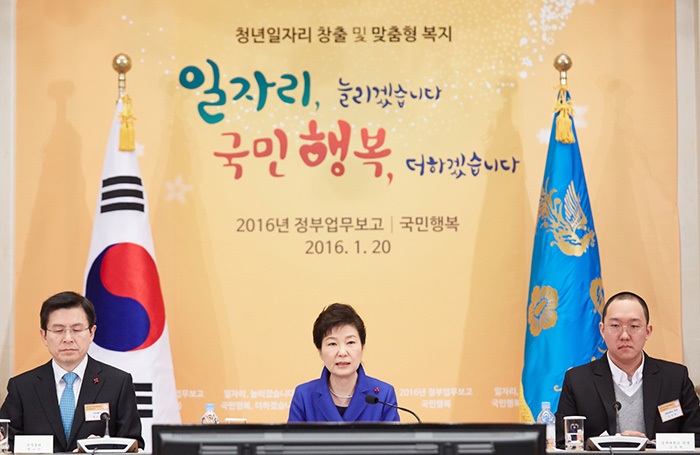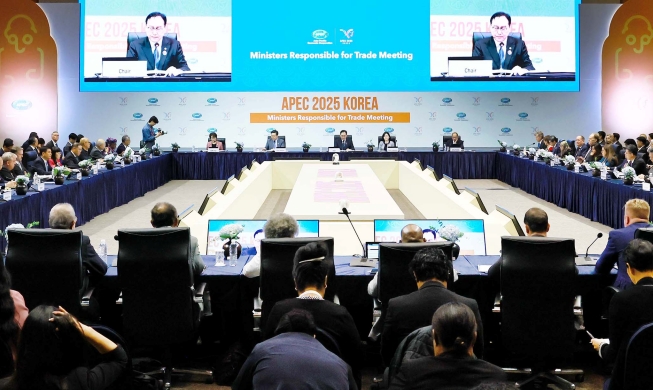The government has vowed to work toward youth job creation and toward an individualized welfare service in order to improve the quality of life for all Korean citizens.
Four government ministries announced their measures aimed at those goals during a policy briefing at Cheong Wa Dae on Jan. 20. Among them were the Ministry of Health & Welfare, the Ministry of Gender Equality & Family and the Ministry of Education.

Firstly, the Ministry of Health & Welfare will reduce the cost for various medical treatments. Thanks to the ministry’s plan, starting this July, patients with tuberculosis who used to pay 10 percent of the total cost of medical treatment will no longer pay anything. Starting this year, healthcare insurance will apply to about 200 types of medical treatments covering the four major causes of death, which used to be regarded as non-applicable. Patients will pay lower than 10 percent of the cost of some medical treatments like induced ultrasounds, a sleep endoscopy and high-priced anti-cancer drugs.
Healthcare insurance for dental implants or dentures will now apply to those who are aged only over 65, down from over 70. The ministry will provide integrated nursing care at 400 hospitals this year, over the 112 hospitals covered last year. Under such integrated nursing & care services, nurses will take responsibility for caring for the patients. The health ministry will also form a new team that will provide individualized welfare services at 700 local community centers in order to identify residents who need welfare benefits the most.
The government will also strengthen its support for overcoming the low birth rate. Starting in the second half of this year, when a pregnant person gets a Caesarian section, the cost of the operation and hospital bills will be halved or more. The new parent will only pay about five percent of the overall medical bill, not the existing amount of about 20 percent. The parent will also pay only half of the total medical cost if she is admitted to hospital and gets a single room or a room for up to three people from three to five days. Starting in October this year, healthcare insurance will apply to prenatal ultrasonography so that pregnant people will only have to cover 30 percent of the cost. The government will also increase the amount of financial support for pregnant people to KRW 700,000 from the current KRW 500,000. Healthcare insurance will also apply to ultrasonography for new-born babies, which used to be considered a non-applicable item.
To help readjust the work-life balance, the Ministry of Gender Equality & Family will provide financial support for small- and medium-sized enterprises (SMEs) that operate flexible work hours, that work from home or that have up to five employees who telecommute by providing financial support worth some KRW 200,000 to KRW 300,000 per employee at the firm. By doing so, it hopes to encourage use of the automatic parental leave system among SMEs so that female workers can apply for both maternity leave and generic parental leave at the same time.
Under the ministry’s new policies, if a father applies for parental leave for a child, he can receive monthly benefits that equal 100 percent of his regular wage for up to three months, not the current period of one month. The new policy extends the length of time with reduced hours during child care periods so that workers can use the system for up to two years, not one year. Thanks to the new policy, workers can now use their parental leave by dividing it three times, not only twice.
The Ministry of Employment & Labor and the Ministry of Education announced new measures to generate high quality jobs. Concentrating on reforms in the work performance-based wage system, the employment ministry will set up two guidelines about general dismissal and change the rules of employment. It will also set up ways to widely apply the work performance-based wage system among public officers.
The employment ministry will apply a salary peak at 1,150 workplaces, including 770 SMEs, helping them to implement a salary peak system. Last year, the government’s salary peak project focused on only large companies.
To narrow the gap between regular and irregular workers, the employment ministry will set up a roadmap for the development and management of goals and performance for its policy on irregular workers. In regard to internships, this January the ministry will set up guidelines designed to protect interns. These guidelines will define the legal status of interns and ways to protect their employment conditions.
In order to expand the employment of high school graduates, the Ministry of Education will increase the number of students at specialized vocational high schools and at Meister high schools to 30 percent of the total number of high school students by 2022, up from the current 19 percent. It will also work to raise the employment rate of vocational and Meister high schools to 50 percent by next year, from last year’s 46.6 percent. The ministry will also establish so-called "colleges for lifetime education" in order to raise the number of high school graduates who wish to receive a university education after they get employment to 60,959 this year, from last year’s 56,132.
During the policy briefing President Park Geun-hye asked for the ministries to strive for the happiness of the people. She said, “An education, a job, welfare and a healthy work-life balance are all directly related to the lives of the citizens. I hope the ministries concentrate on proper implementation of their newly introduced policies so that the citizens can fully benefit.”
By Yoon Sojung
Korea.net Staff Writer
Photos: Cheong Wa Dae
arete@korea.kr

Four government ministries announced their measures aimed at those goals during a policy briefing at Cheong Wa Dae on Jan. 20. Among them were the Ministry of Health & Welfare, the Ministry of Gender Equality & Family and the Ministry of Education.

At a Cheong Wa Dae policy briefing on Jan. 20, four government ministries report their new policies that focus on job creation for youth and individualized welfare services, all in order to promote happiness among the people.
Firstly, the Ministry of Health & Welfare will reduce the cost for various medical treatments. Thanks to the ministry’s plan, starting this July, patients with tuberculosis who used to pay 10 percent of the total cost of medical treatment will no longer pay anything. Starting this year, healthcare insurance will apply to about 200 types of medical treatments covering the four major causes of death, which used to be regarded as non-applicable. Patients will pay lower than 10 percent of the cost of some medical treatments like induced ultrasounds, a sleep endoscopy and high-priced anti-cancer drugs.
Healthcare insurance for dental implants or dentures will now apply to those who are aged only over 65, down from over 70. The ministry will provide integrated nursing care at 400 hospitals this year, over the 112 hospitals covered last year. Under such integrated nursing & care services, nurses will take responsibility for caring for the patients. The health ministry will also form a new team that will provide individualized welfare services at 700 local community centers in order to identify residents who need welfare benefits the most.
The government will also strengthen its support for overcoming the low birth rate. Starting in the second half of this year, when a pregnant person gets a Caesarian section, the cost of the operation and hospital bills will be halved or more. The new parent will only pay about five percent of the overall medical bill, not the existing amount of about 20 percent. The parent will also pay only half of the total medical cost if she is admitted to hospital and gets a single room or a room for up to three people from three to five days. Starting in October this year, healthcare insurance will apply to prenatal ultrasonography so that pregnant people will only have to cover 30 percent of the cost. The government will also increase the amount of financial support for pregnant people to KRW 700,000 from the current KRW 500,000. Healthcare insurance will also apply to ultrasonography for new-born babies, which used to be considered a non-applicable item.
To help readjust the work-life balance, the Ministry of Gender Equality & Family will provide financial support for small- and medium-sized enterprises (SMEs) that operate flexible work hours, that work from home or that have up to five employees who telecommute by providing financial support worth some KRW 200,000 to KRW 300,000 per employee at the firm. By doing so, it hopes to encourage use of the automatic parental leave system among SMEs so that female workers can apply for both maternity leave and generic parental leave at the same time.
Under the ministry’s new policies, if a father applies for parental leave for a child, he can receive monthly benefits that equal 100 percent of his regular wage for up to three months, not the current period of one month. The new policy extends the length of time with reduced hours during child care periods so that workers can use the system for up to two years, not one year. Thanks to the new policy, workers can now use their parental leave by dividing it three times, not only twice.
The Ministry of Employment & Labor and the Ministry of Education announced new measures to generate high quality jobs. Concentrating on reforms in the work performance-based wage system, the employment ministry will set up two guidelines about general dismissal and change the rules of employment. It will also set up ways to widely apply the work performance-based wage system among public officers.
The employment ministry will apply a salary peak at 1,150 workplaces, including 770 SMEs, helping them to implement a salary peak system. Last year, the government’s salary peak project focused on only large companies.
To narrow the gap between regular and irregular workers, the employment ministry will set up a roadmap for the development and management of goals and performance for its policy on irregular workers. In regard to internships, this January the ministry will set up guidelines designed to protect interns. These guidelines will define the legal status of interns and ways to protect their employment conditions.
In order to expand the employment of high school graduates, the Ministry of Education will increase the number of students at specialized vocational high schools and at Meister high schools to 30 percent of the total number of high school students by 2022, up from the current 19 percent. It will also work to raise the employment rate of vocational and Meister high schools to 50 percent by next year, from last year’s 46.6 percent. The ministry will also establish so-called "colleges for lifetime education" in order to raise the number of high school graduates who wish to receive a university education after they get employment to 60,959 this year, from last year’s 56,132.
During the policy briefing President Park Geun-hye asked for the ministries to strive for the happiness of the people. She said, “An education, a job, welfare and a healthy work-life balance are all directly related to the lives of the citizens. I hope the ministries concentrate on proper implementation of their newly introduced policies so that the citizens can fully benefit.”
By Yoon Sojung
Korea.net Staff Writer
Photos: Cheong Wa Dae
arete@korea.kr

During the policy briefing on Jan 20, President Park Geun-hye (center) asks for the government ministries to properly implement policies in order to improve the quality of life for all Koreans.
